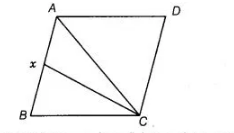$A B C D$ is a parallelogram and $X$ is the mid-point of $A B$. If $\operatorname{ar}(A X C D)=24 \mathrm{~cm}^{2}$, then $\operatorname{ar}(A B C)=24 \mathrm{~cm}^{2}$.
False
Given, $A B C D$ is a parallelogram and ar $(A X C D)=24 \mathrm{~cm}^{2}$
Let area of parallelogram $A B C D$ is $2 y \mathrm{~cm}^{2}$ and join $A C$.

We know that, diagonal divides the area of parallelogram in two equal areas.
$\therefore \quad \operatorname{ar}(\Delta A B C)=\operatorname{ar}(A C D)=y \quad$ [say]
Also, $X$ is the mid-point of $A B$.
So, $\operatorname{ar}(\Delta A C X)=\operatorname{ar}(B C X)$ [since, $X$ is median in $\triangle A B C$ ]
$=\frac{1}{2} \operatorname{ar}(A B C)=\frac{1}{2} y$
Now, ar $(A X C D)=\operatorname{ar}(\triangle A D C)+\operatorname{ar}(A C X)$
$24=y+\frac{y}{2}$ [given]
$\Rightarrow$ $24=\frac{3 y}{2}$
$\Rightarrow$ $y=\frac{24 \times 2}{3}=16 \mathrm{~cm}^{2}$
Hence, $\operatorname{ar}(\Delta A B C)=16 \mathrm{~cm}^{2}$
Therefore, given statement is false.
